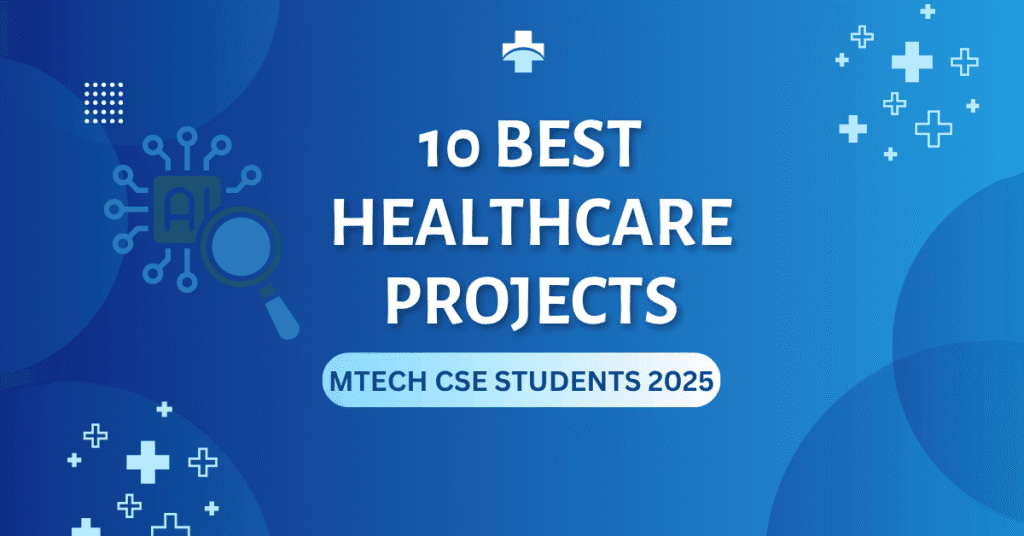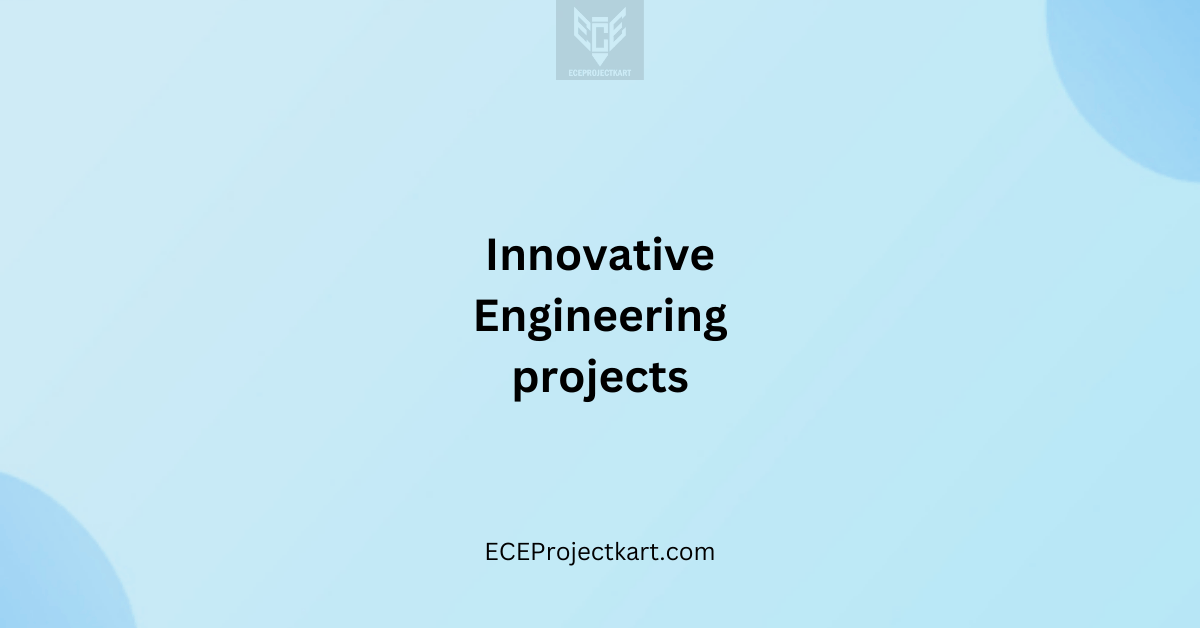Healthcare Projects for MTech CSE Students [2025] – AI, ML & Data Science Based Ideas

Choosing the right MTech project is a challenge for every CSE student. Among the trending domains, healthcare projects for MTech students stand out as one of the most impactful areas — combining Artificial Intelligence (AI), Machine Learning (ML), and Data Science to solve real-world medical problems.
From disease prediction to medical image analysis, these projects not only enhance your technical skills but also help you contribute to something meaningful — improving healthcare systems and patient outcomes.
Need coding help, project reports, or one-to-one guidance? – Chat with Expert
Why Choose Healthcare Projects for MTech CSE Students
Healthcare is one of the fastest-growing AI and ML research domains. As a CSE student, developing healthcare-based software projects gives you:
- High research and IEEE paper potential – ideal for MTech thesis and publications.
- Real-world application – AI and data science can predict diseases, analyze medical scans, and optimize hospital workflows.
- Skill enhancement – master Python, TensorFlow, Keras, and Scikit-learn.
- Strong career value – AI-healthcare is among the most in-demand tech career paths in 2025.
💬 Pro tip: Healthcare projects not only boost your profile but also lead to roles in data analytics firms, healthcare IT companies, and MedTech startups.
Top 10 Healthcare Projects for MTech CSE Students [2025]
Explore the most in-demand AI, ML, and Data Science healthcare projects designed specifically for MTech CSE students. Each project can be implemented using Python, TensorFlow, and real datasets from Kaggle or UCI.
1️⃣ Enhancing Liver Cirrhosis Diagnosis Using Machine Learning & Explainable AI
Objective: Develop an interpretable ML framework for early diagnosis of liver cirrhosis using medical datasets.
Key Techniques: Explainable AI (SHAP, LIME), hyperparameter optimization (GridSearchCV / Bayesian search).
Expected Output: Transparent model visualizations highlighting critical biomarkers for diagnosis accuracy improvement.
2️⃣ Cardiac Clarity: Harnessing Machine Learning for Accurate Heart-Disease Prediction
Objective: Predict the likelihood of heart disease using patient clinical data with ML algorithms.
Key Techniques: Random Forest / XGBoost with feature importance visualization.
Expected Output: Heart-disease prediction dashboard with performance metrics and explainable reasoning charts.
3️⃣ XAI & GenAI-Based Alzheimer’s and Parkinson’s Disease Detection Using Deep Learning
Objective: Detect and classify neurological disorders (Alzheimer’s, Parkinson’s) from MRI or clinical datasets.
Key Techniques: CNN + LSTM hybrid model, Explainable AI (Grad-CAM), and Generative AI for automated report synthesis.
Expected Output: Diagnostic classification results with interpretable visual maps and AI-generated health summaries.
4️⃣ Doctor–Patient Conversational Assistant Using Generative AI and Voice Interface
Objective: Build a voice-enabled AI assistant that interacts with patients to collect symptoms and suggest preliminary health advice.
Key Techniques: Large Language Models (LLMs), Speech-to-Text (Whisper / Vosk), and Text-to-Speech (gTTS).
Expected Output: Conversational healthcare chatbot capable of generating context-aware, natural medical responses.
5️⃣ Mental Health Journal Generator Using Generative AI
Objective: Create an AI tool that generates personalized daily mental-health reflections and mood-tracking summaries.
Key Techniques: Generative AI (LLMs like GPT / Llama-2), sentiment analysis, and text generation pipelines.
Expected Output: Automated digital mental-health journal providing therapeutic conversation and progress tracking.
6️⃣ XAI-Based Lung Disease Identification and Explanation Using Deep Learning
Objective: Detect lung diseases such as pneumonia and fibrosis from chest X-ray images using explainable deep learning.
Key Techniques: CNN (ResNet / DenseNet), Grad-CAM for model transparency, SHAP for feature visualization.
Expected Output: Disease prediction results with XAI-driven heatmaps highlighting affected lung regions.
7️⃣ Transparent Anaemia Prediction Model Using Explainable AI
Objective: Develop a machine learning model to predict anaemia severity using patient clinical parameters.
Key Techniques: Random Forest / LightGBM with Explainable AI (LIME/SHAP) to visualize influencing features.
Expected Output: Transparent diagnostic model showcasing key attributes (Hb level, RBC count, MCV) affecting predictions.
8️⃣ XAI & GenAI-Based Pneumonia Detection Using Deep Learning
Objective: Combine explainable and generative AI for pneumonia detection from chest X-rays and automated report generation.
Key Techniques: CNN-based classification (EfficientNet), Grad-CAM visualization, Generative AI for summary generation.
Expected Output: Detected pneumonia region with an auto-generated doctor-style diagnostic summary.
9️⃣ Explainable Smartwatch Assistant for Mental Health Monitoring
Objective: Design an AI system that analyzes smartwatch sensor data to assess user stress and mental well-being.
Key Techniques: Explainable ML (Decision Trees, XAI dashboards), time-series analysis, and emotion classification.
Expected Output: Real-time stress-level predictions with interpretable insights on heart-rate and activity trends.
🔟 Generative AI-Based Medical Prescription Summarizer
Objective: Use Generative AI to extract, interpret, and summarize medical prescriptions into patient-friendly text.
Key Techniques: OCR (Tesseract / PaddleOCR), NLP (BERT / GPT models), and summarization pipelines.
Expected Output: Automatically generated summaries explaining dosage, medication timing, and purpose in simple language
AI & Machine Learning in Healthcare Projects
AI and ML are redefining healthcare. As an MTech CSE student, mastering these technologies allows you to:
- Automate diagnosis using Deep Learning (CNNs, RNNs).
- Build predictive systems for disease detection and treatment planning.
- Apply NLP to develop chatbots and virtual health assistants.
- Use Python frameworks like TensorFlow and Keras for model deployment.
Focus on using real datasets — Kaggle and UCI repositories have healthcare datasets you can directly use for your project.
Data Science & Analytics in Healthcare
Data Science in healthcare focuses on analyzing massive datasets to make data-driven decisions. You’ll work with patient records, hospital data, and medical images to uncover trends and predictions.
Key applications include:
- Predictive modeling for patient outcomes.
- Data visualization dashboards for hospital analytics.
- Feature engineering from raw clinical data.
- Model accuracy optimization and bias removal.
Tools & Technologies Used in Healthcare Projects
Here’s a quick list of tools you’ll need for software-based healthcare projects:
Programming Languages: Python, R
Frameworks: TensorFlow, Keras, Scikit-learn, PyTorch
Libraries: NumPy, Pandas, OpenCV, NLTK, Matplotlib
Platforms: Google Colab, Kaggle, Jupyter Notebook
These tools help you build, train, and test your healthcare models efficiently — no hardware required.
How to Choose the Right Healthcare Project Topic
Follow this quick checklist to select the right MTech project:
✅ Identify your focus area – AI, ML, NLP, or Data Analytics.
✅ Use real-world datasets (Kaggle, UCI Machine Learning Repository).
✅ Read recent IEEE papers to find trending healthcare ideas.
✅ Evaluate feasibility — choose projects that can be completed in 2–3 months.
✅ Focus on coding depth and innovation.
FAQs
Get Expert Help for Your MTech Healthcare Project
Still unsure which healthcare project to pick or need help implementing your idea?
We offer complete support for MTech CSE students:
✅ Custom project ideas based on AI, ML & Data Science
✅ Source code + Report + PPT
✅ IEEE Paper Guidance
✅ One-to-one Consultation (Online + Pune-based)
Conclusion
Healthcare-based MTech projects are shaping the future of technology-driven medical innovation. With the integration of AI & ML, students can create intelligent systems that solve real-world healthcare challenges.
Whether you’re working on image processing, data analytics, or IoT-enabled health monitoring, the right guidance can turn your project into a research opportunity worth showcasing.
- Checkout more MTech Projects for Computer Science Students.
[addtoany]
Decided your project topic?
Contact us today to learn more about how we can help you with your MTech final year project.
Contact
+91 7058787557
info@eceprojectkart.com
Pune, Maharashtra

